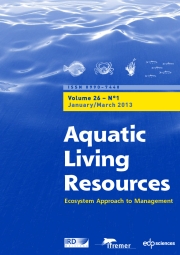Article contents
Effects on phytoplankton growth of dissolved substances produced by fish farming
Published online by Cambridge University Press: 15 April 1996
Abstract
Fish Farming enriches the water column in dissolved organic and inorganic material. These materials excreed by the fish, elutriate from uneaten food and derive from other polluting substances. Ratios of the organic/inorganic forms of substances (for example N and P) are thus modified. Such perturbations in turn affect phytoplankton development. From in vitro analyses and tests of water taken from a turbot rearing tank, we show the changes in seawater chemical composition produced as well as the way growth was modified in three phytoplankton species: the diatom, Chaetoceros gracile, and the dinoflagellates, Gymnodinium cf. nagasakiense and Alexandrium minutum. Elutriates from the granules used for feed (0.1 to 100 mg.l−1) were found to be stimulating, particularly for Gymnodinium. Alexandrium was strongly inhibited both by turbot-tank water diluted 10-fold with coastal seawater and by diluted faeces elutriates. Urea added at low concentrations (1 to 2.5 µmol.l−1) inhibited growth in Alexandrium and Chaetoceros, but at 1 µmol.l−1 it stimulated growth in Gymnodinium. The antibiotic, Oxytetracycline was complex in its effects, with growth inhibition being observed in Chaetoceros and Gymnodinium, but stimulation in Alexandrium (at 0.2 mg.l−1). In general, we found fish farming to allow phytoplankton growth, except for Alexandrium in a few cases. Additions to the water from fish farming may regulate growth in some species. As such additions act differently on growth in different species, fish farming is likely to markedly modify species composition in its vicinity.
Keywords
- Type
- Research Article
- Information
- Copyright
- © IFREMER-Gauthier-Villars, 1996
- 8
- Cited by


